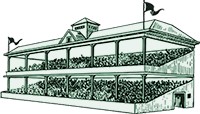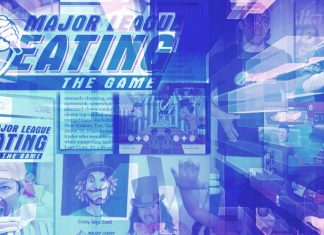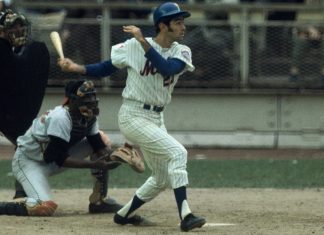If you love seeing games in the flesh, you’ve probably thrown your money at a secondary ticket sales market like StubHub or SeatGeek. You’ve probably also looked at the prices, thought “this is ridiculous, there’s no way I’m paying that”, waited a few days, watched the prices go even higher, and then, bitterly, bitten the bullet. This little game of wait-and-see-and-get-screwed is how the ticket resale market has grown into a multi-billion-dollar-a-year industry.
Despite this frustration, fans usually don’t focus their anger on the team or the sites or the laws that govern these sales— they direct it at scalpers. They believe that scalpers swoop-in and buy a large number of tickets from main ticket distributors like Ticketmaster (snatching away a fan’s chance to buy tickets at face value), and then toss them on a secondary sales website like StubHub or SeatGeek at a huge mark-up, profiting off of the fans’ desperation. And in some extreme cases, pricing fans out of the chance to see their favourite artists perform for the last time, ever.
Recently, I had the opportunity to get the other side of the story. I spoke with an online scalper about the ticket resale business, how he operates, what he thinks about the word scalper, and the rise of ticket-buying bots. Agreeing to speak with the condition of anonymity, the interviewee will be referred to as “V�?.
Grandstand Central: What do you call what you do?
V: I refer to myself as a Professional Ticket Broker. I dislike the term scalper since the actual definition refers to someone who holds the item for a short period of time in order to make small profits. My strategy is more of a buy-and-hold approach, where I wait for prices to rise over time.
How does that work exactly?
I spend the majority of my time researching profitable events to resell. There are many factors which determine the potential profitability of an event. I can’t share most of these factors but some of the more basic ones are the cost of the ticket, date/time of the event (weekend vs weekday, evening vs afternoon), and the market in which the event is taking place (large metro areas vs less populated areas).
After my research is complete, the actual business model is to purchase tickets from the primary marketplace (i.e. Ticketmaster or AXS.com) when they go on sale with the intention to resell it for a profit in the secondary marketplaces (Stubhub, Seatgeek, Vividseats, etc).
What’s your background?
I graduated from college in 2014 with a degree in accounting and finance. Since then, I’ve held a full-time job in the commercial real estate industry. Reselling tickets is my side job at the moment although the amount of hours I put into it is at least equal to that of my full-time job.
Why did you to get into ticket re-selling?
I had experience starting/running an online business because I helped my parents put some of their products from their small business on eBay when I was in high school and college.
I would say that I got into the ticketing industry because of my interest in attending live events. I’m a huge Boston Celtics fan, and I worked like 10 minutes from TD Garden.
As most people know, ticket prices tend to fall sharply as the event gets closer to start time. I would buy last minute Celtics’ tickets at an extremely cheap price, back during the 2014–15 season when they weren’t as popular, and go straight after work.
I always wondered about the economics of the ticketing market and if there was a way to profit off the steep drop in price as the event time got closer. Turning this idea into an actual business was just luck.
Back in 2015, I purchased 5 tickets for my friends and and I to attend an extremely popular event for the computer game League of Legends at Madison Square Gardens. The tickets cost about $50 each and sold out in minutes. Two of my friends dropped out, and I was left with two tickets that weren’t going to be used. I checked Stubhub and much to my surprise, the tickets that I’d purchased (lower bowl) were going for well over $300 each. I ended up selling those two tickets, which had only cost me a bit over $100 for a $450 profit after fees. After this, I began to think I could turn this into a business.
Has there ever been a time where you felt like getting out of the business and doing something else?
No. In fact I could get out of my full-time day job and just rely on this as my sole income.
Walk me through your process, from the time you buy tickets to when you sell them.
The majority of my time is researching events to determine their profitability. As far as the actual buying process, my team and I are ready to purchase tickets the second they go on sale. Even if you’re 30 seconds late, that’s the difference between purchasing tickets and getting nothing at all. The tickets are then broadcast through a point-of-sale software which allows the tickets to be posted to multiple secondary marketplaces. In most cases, these tickets are held for weeks to months before they’re sold.
Are they higher level tickets? Lower level? Or a little bit of both?
It depends on a number of factors. The most important one is obviously price. Not just actual price but the price in comparison to each other (lower bowl vs upper bowl vs floor seats). I like to say that my decision is primarily based on which seats are the most price efficient.
Fans often vilify scalpers for being predatory, and making it too expensive to attend live events. Do you think that’s a fair criticism?
Yes and no. I believe people who cheat and game the system by using bots or ticketing software to purchase tickets before a legitimate person has any chance at them should be vilified and should be punished or fined excessively.
In the United States, there was recently a law passed called the BOTS act which makes it illegal to use bots or ticketing software for the use of purchasing tickets. So that’s a first step in the right direction. The vast majority of ticket brokers such as myself do not use bots to purchase tickets, but there are a handful that do use them which ruins it for everyone.
Bots are the reason a real fan refreshes their page to buy tickets exactly when they go on sale and are often left with no results. As far as being predatory, I view event tickets as a commodity that should be allowed to be traded in the free market just like nearly everything else is in the United States.
People are outraged when they have to purchase a ticket above face value but have no problems buying a beer for $12 when they are at the event. That same beer on tap costs the venue no more than $1 but people are not nearly as outraged as paying that upcharge because they accept it as the way it is.
I believe that there are benefits to having a secondary market where tickets are sold above face value. If the resale of tickets were restricted, then any major event such as the Superbowl, NBA Finals, etc. would not be accessible to the normal fan. Nobody would resell their ticket if they were only able to recoup the cost of the ticket. It would also create a black market for these tickets where scammers would be everywhere.
If the secondary market didn’t exist, you would be forced to buy these tickets from Craigslist or a scalper outside the stadium where you would have to pay cash and there are no guarantees if the ticket doesn’t work. So in sort of a backwards way, the ability to resell tickets does make events more accessible to the normal fan.
If you were to pick a random event on Stubhub, it’s more likely that the average ticket for that event is being sold at below face value rather than above face value. The big stories everyone hears about is when there’s a huge show or event that everyone wants to go to, and tickets are being sold at ridiculous prices. This prices out the average fan and causes a big outrage. There are no stories on how people are about to attend a baseball or basketball game for $10 a person when the average cost of those tickets would be well over $50.
How have teams and venues responded to digital resale platforms like SeatGeek, Stubhub, and SeatGiant?
Teams and venues are beginning to work with resale platforms to integrate in order to make the resale of tickets safer for the consumer. I recently attended Ticket Summit 2018 and the NATB (National Association of Ticket Brokers) conference that’s held annually in Las Vegas. Both Stubhub and Seatgeek boasted about their new partnership with the NFL where tickets would be integrated, creating a seamless transaction for the buyer. This also reduces the chances of fraud to essentially zero because with integration, the original ticket becomes void and the ticket is reissued.
What is the scalper/venue and/or team relationship like?
Many brokers who primarily do sports hold many season tickets. As you might expect, reselling season tickets individually for teams that are bad or have a bad product on the court/field isn’t particularly profitable. Many brokers hold their tickets through this time so they’ll have them when the team is good again. That way, they’ll be able to sell them for a profit and potentially have guaranteed access to playoff tickets for those seats. The team benefits in this arrangement because they are able to sell tickets to resellers in down years that a fan would not want.
Many small brokers recently have complained that their season tickets are being cancelled as soon as the team becomes good again. The teams are breaking the unwritten contract that if you support us by purchasing unsold tickets in down years, you will have them in the good years.
I would say the relationship between teams and small brokers such as the situation I described is contentious at best. The main issue is that teams and venues enter into contracts with “consolidators�? or large ticket brokers who will buy a large allotment of available seats for a profit share agreement with the team.
This hurts the typical fan because there’s less inventory on the primary market due to contracts like this. The team or venue will then say they do not tolerate people who resell their tickets for large markups but they are indirectly doing so themselves by selling them to consolidators. There is a large well-known ticket company in Boston that is a consolidator for the 4 major Boston sports, which is where they receive most of their inventory from.
How is digital scalping different than the picture we have in our heads of a guy screaming outside of a stadium that they have tickets?
Same difference as online shopping versus going to the mall nowadays. Easier and more convenient for both buyer and seller.
In most cases, the tickets are delivered directly to the purchaser’s phone. It doesn’t get much more convenient than that.
For the seller, everything can be done in front of a computer with no interaction with the customer at all. As you could understand, most scalpers prefer staying anonymous.
Estimating, how much money do you bring in scalping?
I will say that 80–85% of my net worth is currently held in tickets.
How has your income changed over time, if at at all?
It has grown from year-to-year mainly because the profits being reinvested in new tickets and my risk tolerance being higher as I gain more experience.
Do you have any sort of competition? If so, how have your competitors made you change the way you operate?
Yes, my competition would be the teams and venues themselves becoming smarter and pricing their tickets closer to market value. The profits in this industry relies on arbitrage and speculation and if teams/venues becomes smarter in how they price their ticket, then that opportunity goes away and I would have to look elsewhere for profit.
They’ve also started to introduce dynamic pricing which actually adjusts the price of the ticket based on the demand/web traffic that they get when the ticket goes on sale. Taylor Swift’s most recent tour employed this pricing strategy which upset many of her fans. The same tickets they paid $300 for on the day of the sale dropped to $50 on the day of the show. In a way, that pricing strategy screwed over her loyal fans who wanted to purchase the tickets as soon as they were available.
Do you ever fear some type of government intervention in the ticket resale market? Why or why not?
I did mention the BOTS act before which is a positive change regulation wise.
As far as restricting the resale of tickets, I’m not to concerned with any regulatory changes in the market. The secondary market is a large industry and as I said before, having a secondary market is healthy that allows all fans to attend even the most hyped events and protects the consumer because as long as they purchase through a trusted secondary site, they are always entitled to a replacement ticket or a 100–200% refund if the ticket does not work.















